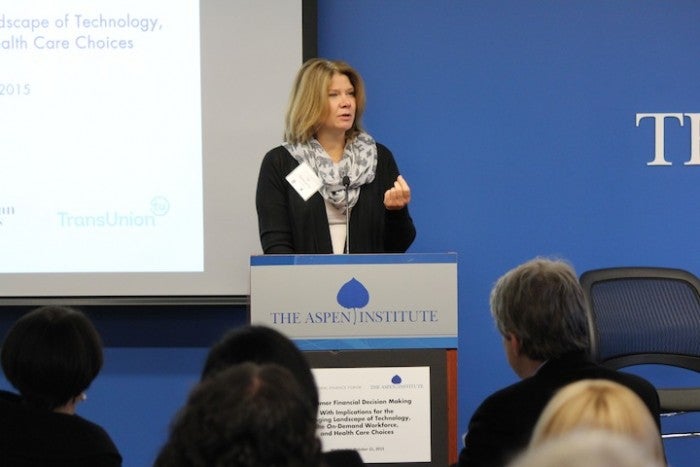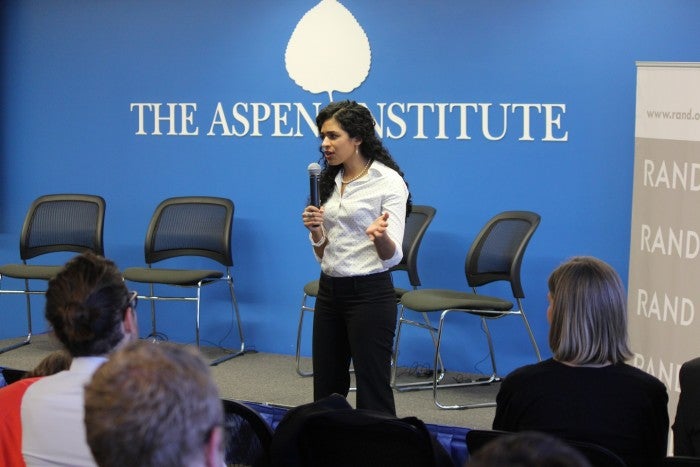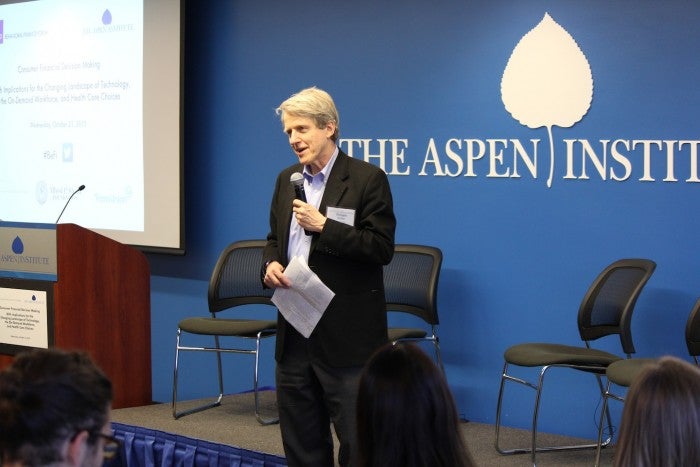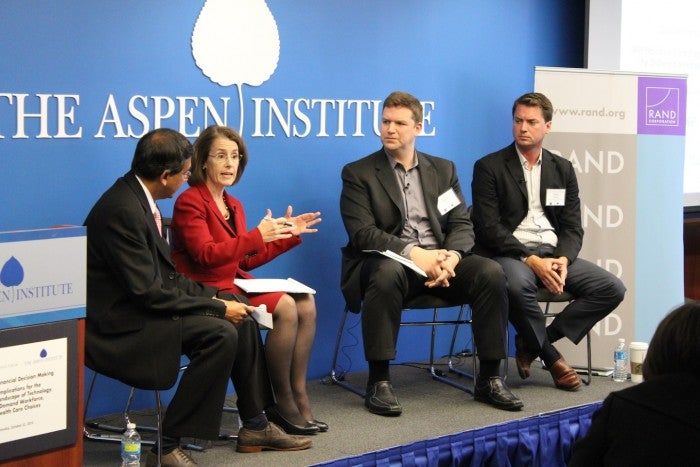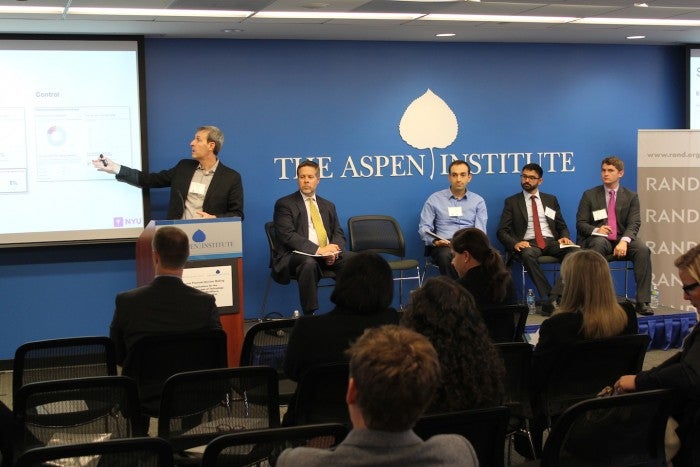On October 21st, Aspen FSP partnered with the Rand Corporation and the Institute for the Future to host the 2015 Behavioral Finance (BeFi) Forum at the Aspen Institute in Washington, DC. Since 2008, the BeFi forum has provided a platform for the academic community to present cutting-edge financial and economic behavioral decision making research. This year’s forum focused on consumer financial decision making, including discussions on new technology platforms, the on-demand workforce, savings and credit, and health care choices. The forum featured Aspen FSP Executive Director Ida Rademacher and Associate Director Jeremy Smith as panel moderators, and Yale Professor and Nobel Laureate Robert J. Shiller as the Keynote Speaker.
To kick off the forum, Maya Shankar, Chair of the Social and Behavioral Sciences Team at the White House Office of Science and Technology Policy, presented results of the team’s attempt to apply behavioral insights to public programs. For example, the team found that simple nudges, such as prompting a choice to enroll at orientation or redesigning email reminders, increased retirement plan take-up among members of the armed forces. These promising outcomes show how collaboration between behavioral science experts and policy experts can lead to greater public program effectiveness.
In the keynote address, Robert Shiller, Sterling Professor of Economics at Yale University, gave his insights on the potential negative consequences of nudging. In his new book, Phishing for Phools: The Economics of Manipulation and Deception, Shiller and his co-author and fellow Nobel Laureate George Akerlof argue that private companies are constantly employing behavioral techniques to maximize their profit and stay alive in a competitive market. “Nudging is a new idea for the government, but marketers do it all the time,” Shiller said. It is important for consumer protection and regulation to be aware of the way companies use behavioral science for profit. “There is a lot of nudging, but not generally in the public spirit,” Shiller warned.
In the Spotlight Panel, “The Changing Behavioral Finance Landscape: Technology and the On-Demand Workforce,” panelists discussed challenges of the changing labor market and innovations that can improve worker financial well-being. Devin Fidler, Director of the Workable Futures Initiative at Institute for the Future, identified the disconnect between entrepreneurial culture and workers as a serious challenge to the on-demand economy. However, Fidler was optimistic that we can build a positive platform for contingent workers. Maureen Conway, Executive Director of the Economic Opportunities Program at the Aspen Institute, pointed out that many of the new forms of contingent work exclude people without certain assets (e.g., Uber drivers need a car), and that inadequate income reduces saving choices for these workers. “We allow people to save up to $18,000 a year in 401(k) plans, but some people aren’t even making that much,” said Conway. Ryan Falvey, Director of the Financial Solutions Lab, said that information overload is a major challenge for people making financial decisions, and that policymakers should consider regulatory changes to make financial innovation easier.
The forum continued with several panels of researchers presenting their work on behavioral finance. In the panel “Information and Framing in Credit Card Repayment,” Jialan Wang of the Consumer Financial Protection Bureau (CFPB) found that listing minimum payments creates an “anchor” effect that nudges people to pay near the listed minimum amount. Raising the minimum payments on credit cards would save consumers millions of dollars, but could hurt liquidity-constrained consumers. Eduardo Laguna-Muggenburg of Stanford University found that the disclosure policies currently mandated by the Truth in Lending Act have not been effective in decreasing consumer debt or increasing competition among credit card providers. Melissa Knoll of the CFPB asserted that including a simple interest rate percentage was the most effective method of nudging consumers to pay off high-interest accounts first.
In the panel “Behavioral Interventions to Boost Savings,” Oded Nov of New York University demonstrated how behavioral principles can improve savings decisions. By using the simple and familiar framework of a product label (think “nutrition labels on steroids”), Nov and his colleagues created an effective online tool for consumers to better understand the value of holding a diversified portfolio of stocks and bonds. Joshua Tasoff of Claremont Graduate University found that exponential growth bias and present bias are both associated with lower retirement savings, but that self-awareness can mitigate these negative effects. Redis Zaliauskas of the UK Financial Conduct Authority showed that timely and informative reminder letters could be used to correct bias. Moderator Jeremy Smith pointed out that behavioral economics has had a significant impact on retirement policy – especially through defaults – but that we still have a long way to go in closing the coverage gap.
The last panel of the day was titled “Behavioral Biases in Managing Finance.” Chuck Howard from the Sauder School of Business found that individuals’ inability to accurately estimate future expenses (dubbed “expense prediction bias”) could lead to negative consequences such as payday loan use. Fortunately, asking people to consider expense likelihood before predicting their expenses can reverse this bias. Johannes Haushofer of Princeton University discovered that people will make required payments early (“pre-crastinate”) or pay for reminders to avoid the costs of keeping track of upcoming deadlines. Scott Rick of the University of Michigan found that married or cohabitating couples do better than individuals (or even multiple individuals who don’t know each other) at managing multiple debts. Discussant Salar Jahedi of the Rand Corporation asserted that biases are not about misinformation but about conflicting preferences. Moderator Ida Rademacher commended the researchers for shedding light on vital, cross-cutting issues that can translate into policy.
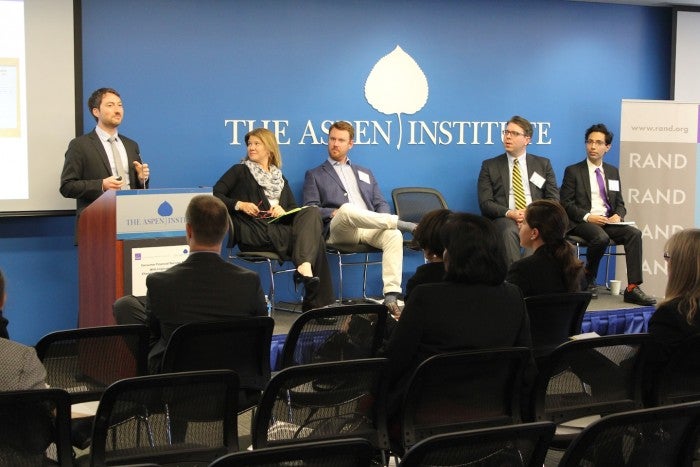
See the full agenda here.
See the full video of the forum here.
